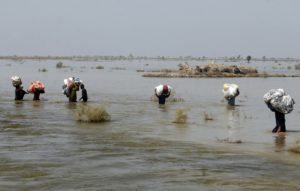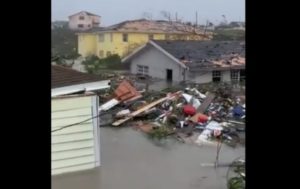Heat Wave Silences Climate Skeptics
It’s odd how little we’ve heard lately from the skeptics who deny that climate change is real. What’s the matter, people? Heat stroke?
It’s odd how little we’ve heard lately from the skeptics who deny that climate change is real. What’s the matter, people? Heat stroke?
The Venus-like heat that much of the country has been suffering this summer is almost enough to make anybody a believer in global warming. Almost, but not quite: Honesty compels me to acknowledge that a few weeks of record-setting temperatures do not constitute proof of anything. Climate scientists have to analyze data covering decades and centuries to discern what’s really going on.
Of course, the unusually heavy snowstorms that buried Washington and other East Coast cities last winter didn’t prove anything, either. But that didn’t deter the climate skeptics from gloating. Sen. James Inhofe, R-Okla., and his family went so far as to build an igloo on Capitol Hill and label it “Al Gore’s New Home.” Care to apologize to the Nobel laureate, Senator?
No, that would be too much to hope for. A more realistic wish is that the punishing heat wave will convince those tempted to buy the skeptics’ know-nothing line — “Global warming is a crock! The tree-hugging socialists are making it up! It’s a conspiracy!” — to consider the scientific evidence with an open mind.
We now know that the e-mail correspondence filched from climate researchers’ computers last year, which skeptics portrayed as some kind of smoking gun, in fact doesn’t amount to a water pistol. The messages reveal that scientists can be petty, envious and vindictive — but do not suggest any fudging of data, according to a report issued Wednesday by a blue-ribbon panel in Britain, where the e-mails were hacked. Two previous investigations similarly have exonerated the climate scientists of fraud and validated their methods.
We also know, according to the National Oceanic and Atmospheric Administration, that “the combined global land and ocean surface temperature” in May was the warmest on record. In fact, NOAA reported, the whole period from January through May, on average, was the warmest since record-keeping began in 1880.
No, that’s not enough to settle the question. But let’s get real. There really isn’t much disagreement among scientists about whether the climate is warming. For the past 100 years or so, we have precise temperature records to compare with today’s measurements. For previous centuries, we have indirect but compelling evidence that the world is getting hotter.
Is human activity to blame? It almost surely is, unless there’s some fundamental flaw in our understanding of chemistry and physics. Scientists understand how molecules of carbon dioxide act to trap heat. They know — not through inference, but from direct measurement of air bubbles trapped long ago in Arctic and Antarctic ice — that there is more carbon dioxide in the atmosphere now than at any time in the last half-million years, perhaps the last million years. The simplest and most logical explanation of why there’s suddenly so much carbon in the air is that humans have put it there by burning fossil fuels. This is what has changed.
The experts who best understand these phenomena are sometimes guilty of overstatement — indeed, they seem never to have met a worst-case scenario they didn’t like. They often come off sounding arrogant, self-righteous, even borderline hysterical. Some of them, when challenged to defend their data or conclusions, seem to regard such scrutiny not as a normal and necessary part of the scientific process but as a threat to human civilization and all that is good and true.
So, yes, there are a few puffed-up jerks on the front lines of the climate change battle. You know who you are. But the fact that some climate scientists would make lousy dinner companions doesn’t change the ways in which matter and energy interact on the molecular level — and doesn’t alter those rising temperature readings.
It’s time to end the silly “argument” over whether climate change is real. Here’s a better question: Would it be more appropriate for humanity to spend, say, $1 trillion reducing carbon emissions, and thus save thousands or millions of lives that could be lost to drought or sea-level rise or whatever at the end of this century or the next? Or spend that money providing clean water in places such as like Congo or Bangladesh, saving thousands or millions of lives right now?
Maybe the answer is that we have to try to do both. But this, at least, is something worth arguing about.
The climate science? Don’t sweat it.
Eugene Robinson’s e-mail address is eugenerobinson(at)washpost.com.
© 2010, Washington Post Writers Group
Your support matters…Independent journalism is under threat and overshadowed by heavily funded mainstream media.
You can help level the playing field. Become a member.
Your tax-deductible contribution keeps us digging beneath the headlines to give you thought-provoking, investigative reporting and analysis that unearths what's really happening- without compromise.
Give today to support our courageous, independent journalists.









You need to be a supporter to comment.
There are currently no responses to this article.
Be the first to respond.